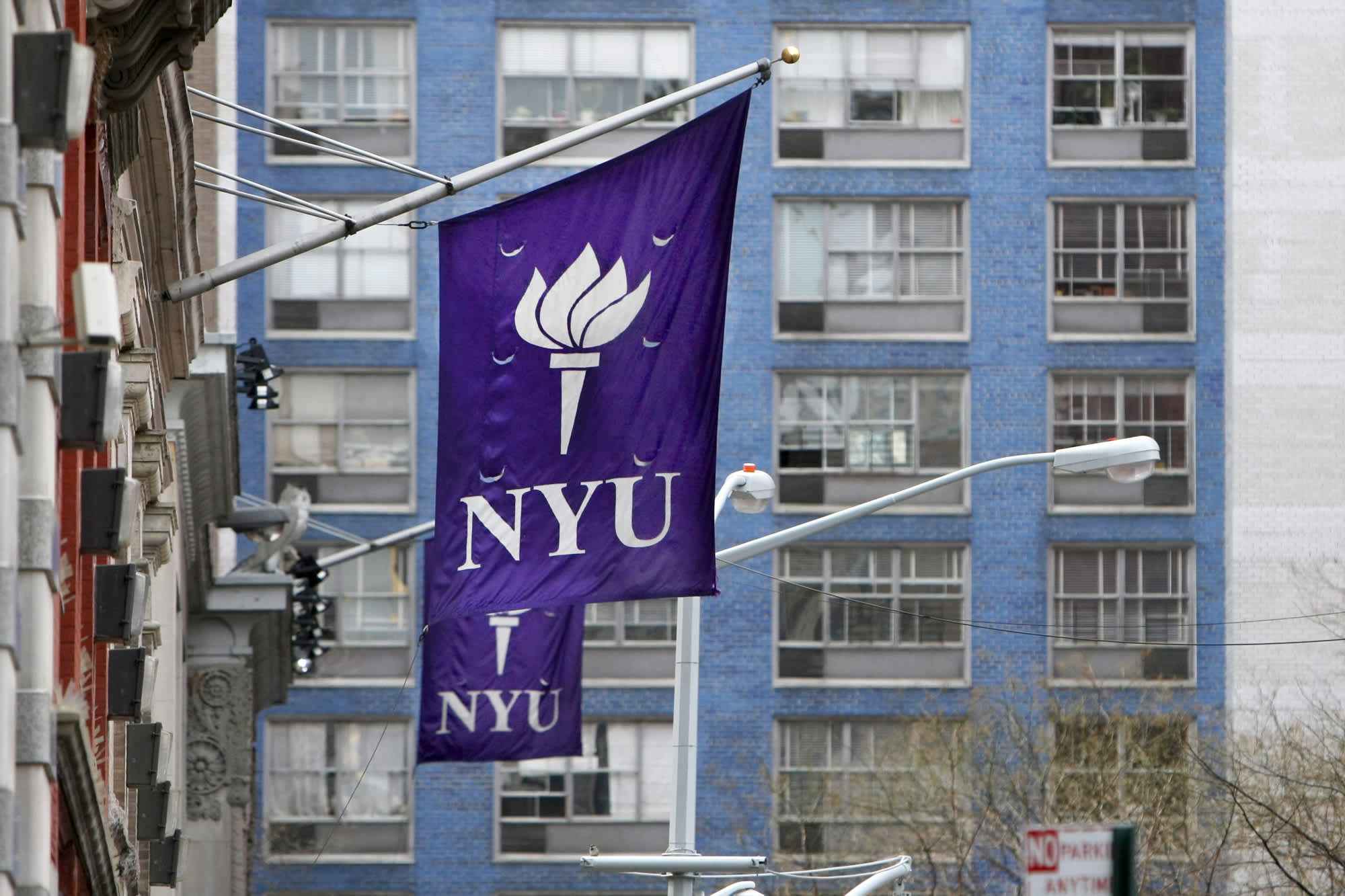Inside NYU Stern’s New MS in Quantitative Management

Getting into business from a non-business background always presents a significant learning curve. And while most MBA programs can help candidates no matter the experience, it can still leave you feeling behind.
Luckily, that may not be the case for NYU Stern’s newly launched online Master of Science in Quantitative Management (MSQM) program. Explicitly designed for non-business majors, it helps students grow business fundamentals and analytics, all from the comfort of home. It’s officially marked as the “first and only top-ranked U.S. business school to deliver an MS in Management online,” according to a recent press release. Continue reading…
Wage Transparency, Rideshare Payouts, and More – New York News

Let’s explore some of the most interesting stories that have emerged from New York business schools this week.
Wage Transparency Works: Reduces Gender Pay Gap by 7 Percent – Columbia Business School
New joint-research from members of the Columbia Business School, INSEAD, the University of Copenhagen, University of North Carolina Kenan-Flagler Business School, and Cornell’s SC Johnson College of Business finds that wage transparency can help close the gender pay gap
Columbia’s Daniel Wolfenzon and his co-authors examined the effect of a 2006 requirement for Danish companies to report on gender pay gaps.
“What surprised us the most was the way in which this wage gap closed. Women’s wages did not increase at a faster rate in treatment firms as we were expecting. Instead, we find that men’s wages in treatment firms grew slower relative to men’s wages in control firms. As a result, the total wage bill grew slower in firms that were required to report wage segregated statistics,” Wolfenzon says.
“What is interesting is that the law has unintended consequences on women’s ability to climb up the corporate ladder and their willingness to join the labor market. When firms adopt fairer wage practices towards women, this can have positive effects on women’s labor market outcomes that go well beyond pay gaps,” UNC Kenan-Flagler Assistant Professor of Finance Elena Simintzi says.
You can learn more about the wage transparency research here.
Market-Driven Drivers: Dynamic Payout Ratio Means More Money, Less Wait – Binghamton School of Management
With the rise of on-demand services from ridesharing, we have become accustomed to getting what we want, when we want it. Binghamton University School of Management Assistant Professor of Supply Chain Management Jiaru Bai knows the secret to discovering how to handle impatient customers: data.

“Having a dynamic payout ratio almost always performs better than a fixed payout ratio, according to our model and data analysis,” says Binghamton Assistant Professor Jiaru Bai / Photo via Jonathan Cohen
Bai and her fellow researchers analyzed rides from Didi, China’s largest on-demand ride-hailing service platform. They found that the optimal solution is to flexibly determine the payout percentage, rather than adhere to a rigid, fixed rate.
“Basically, when demand is high, providers should get paid a higher percentage, and when demand is low, providers should get paid a lower percentage. Having a dynamic payout ratio almost always performs better than a fixed payout ratio, according to our model and data analysis, and it leads to benefits for all involved,” Bai says.
You can read more about the ridesharing research here.
New Research Shows U.S. Consumers Prefer Brands that Support Refugees – NYU Stern Experience News & Events
According to a new report titled “How Helping Refugees Helps Brands” from the NYU Stern School of Business and the Tent Partnership for Refugees, American consumers are more likely to purchase from brands that support refugees. This includes brands that hire refugees, deliver services to refugees, invest in refugee entrepreneurs, and source from refugee businesses.
“This report shows that consumers will reward brands that support refugees,” says Gideon Maltz, Executive Director of the Tent Partnership for Refugees.
“In a crowded marketplace, brands that integrate refugees into their business can distinguish themselves from their competitors, especially among millennials. This is a clear demonstration that brands can do well by doing good.”
The Tent Partnership for Refugees, founded by Chobani’s Hamdi Ulukaya, is mobilizing the private sector to improve the lives and livelihoods of more than 25 million refugees. Ulukaya launched Tent with the hope that the private sector is uniquely positioned to address the global refugee crisis, mobilizing networks, resources, innovation, and the entrepreneurial spirit of the business community. There are over 100 companies in the Tent Partnership supporting refugees across 34 countries, which can be found here.
Professor Tülin Erdem, co-author of the report and chair of NYU Stern’s Marketing Department adds, “It impacts brand image and consumer brand purchase behavior positively.’
“This is consistent with current consumer (especially the millennial consumer) preferences for brands that take a strong stance for social issues and consider the welfare on multiple stakeholders, including the society at large.”
The full report can be accessed online. For more, check out the recent NYU Stern article here.
The Big Picture: The 5 Most Important MBA Numbers of 2018

Each year there’s a ton of new information that comes out about MBA programs. From new rankings to the latest GMAC news, there are a thousand little tidbits that can overwhelm applicants, students, and alumni. We’ve collected the most important MBA numbers of 2018.
To pare down the news into the information you need to know, we’ve taken a look at the big picture of the MBA for 2018 and outlined the five most important pieces of data you need to know. We’re talking about everything from the decline and U.S. MBA applications to the increase in female enrollment, the higher salaries and GMAT scores, as well as the increase in interest in technology. Continue reading…
NYU Employment Report Reveals Employment, Salary Jump

The NYU Stern School of Business released its 2018 MBA Employment Report at the end of last month, revealing that more graduates in the Class of 2018 had accepted full-time job offers three months after graduation than anytime in the past five years. Not only that, many recent grads reported a large jump in salary and bonuses. There are just a few of the highlights from this year’s employment report, which also Amazon topping the this of MBA employers for the second year in a row.
NYU Employment Offers and Salaries Increase
This year, 93.7 percent of MBA graduates from Stern had accepted full-time job offers three months out from graduation. This was up from 91 percent last year, and higher than every year since 2013. As for compensation, average base salary jumped 6.5 percent year over year, to $129,059. Average signing bonus, meanwhile, increased 7.5 percent, to $35,637.
“We begin working hand-in-hand with our MBA students on the recruitment process before they even arrive on campus for their first semester,” says Beth Briggs, Stern Assistant Dean of Career Services. “Our early and continuous engagement, coupled with the quality of our students and a strong employment market in New York City, has led to great results across a variety of career paths. For Stern’s MBA class, the percentage of graduates who accepted job offers within three months of graduation is the highest in five years. Average salaries, average signing bonuses and the number of students reporting signing bonuses have also increased over last year.”
Consulting and Investment Banking Lead Stern Industries
When it comes to where Stern graduates work, the data remains consistent. Consulting and investment banking are the two most popular industries, luring 28.4 percent and 26.2 percent of the class, respectively. This represents a slight increase for both industries over last year. In 2017, consulting drew 26 percent and investing drew 23 percent. Technology and telecommunications stayed steady at 16.5 percent this year, on par with 2017. The only other notable changes in terms of industry appeal were a small dip in consumer packaged goods (falling to 5 percent, from 7 percent last year) and a slight increase in law (rising to 4 percent, from 2 percent).
“While the top three industries employing Stern students are consulting, investment banking, and tech, graduates are pursuing roles in a range of diverse areas including growing industries like fintech,” Briggs explains.

Amazon Hires Most Stern MBA Graduates
Amazon took the top spot for the second consecutive year as the most prolific hiring company of NYU Stern grads. Other top employers of graduates from the Class of 2018 included Credit Suisse, McKinsey & Company, J.P. Morgan, IBM, and Bain & Company. About 77.6 percent of grads accepted jobs in the Northeastern U.S., and 13.2 percent went West.
The majority of students (49.7 percent) received offers of employment from the companies where they completed their summer internships. Of those who chose not to accept a job where they interned, 20.1 percent received an offer from an on-campus scheduled interview. In addition, about 9.7 percent found their job through Stern job postings. The rest of the class found jobs through personal contacts (6.3 percent), external job boards (4.7 percent), or alumni (3.1 percent).
You can view the complete NYU Stern 2018 Employment Report here.
This article has been edited and republished with permissions from Clear Admit.
NYU Stern and Yale SOM Professors Awarded Nobel Prize in Economics

Faculty define a business school. Their research, teaching, mentorship, and influence have tremendous impact on the experience students have while there and often the careers they pursue once they graduate. From the curriculum they shape to the initiatives and centers they help run, faculty are vital. And it certainly never hurts when those faculty are also Nobel Prize winners.
This year, professors at two leading business schools were recognized with the 2018 Nobel Prize in Economic Sciences: Paul Romer at NYU Stern School of Business and William Nordhaus of Yale School of Management (SOM).
Nobel Prize Winners in Economics
At first glance, Romer and Nordhaus might seem unrelated. Romer has spent his career focusing on the nature of economic growth, seeking to answer the burning question, “Why do economies grow and how?” Nordhaus’ work, on the other hand, dives deep into the economic costs of environmental damage in an effort to gauge how much society would be willing to pay to avert climate change.
And yet both men have been hailed by Sveriges Riksbank, which awards the economics prize, as individuals known for “integrating innovation and climate with economic growth,” The Economist reports. They have also both influenced the way other economists think about critically important and complex systems.
Paul Romer
Paul Romer joined NYU Stern in 2010. Currently on leave, Romer is best known for founding the NYU Stern Urbanization Project in 2011, which conducts applied research on how policymakers in the developing world can use city growth to create economic opportunity and enact social reform.
In economics, Romer is known for developing the “endogenous growth model” and other approaches for spurring the market to generate new ideas. These models are based on the belief that the pace of growth and ways in which ideas are translated into growth depends on factors such as state support for research and development of intellectual-property protections. Hailed as a critical step toward understanding patterns of economic growth across the globe, his models highlight that the creation and spread of ideas is necessary for growth, but not alone adequate for initiating it.
In awarding Romer with the Nobel Price in Economics Sciences, the Swedish Academy cited his influence on “integrating technological innovations into long-run macroeconomic analysis.” (NYU Stern News)
William Nordhaus

Photography ©Mara Lavitt October 8, 2018 Evans Hall, Yale School of Management, 165 Whitney Ave. New Haven Yale University press conference presenting William Nordhaus, the Sterling Professor of Economics at Yale University. Nordhaus was awarded the 2018 Sveriges Riksbank Prize in Economic Sciences in Memory of Alfred Nobel.
Yale SOM Professor William Nordhaus has significantly impacted the teaching of economics at the school. A few years ago, he chaired the Yale Carbon Task Force, which looked at the market price of carbon-related products to determine the need for a market correction due to over-consumption or potential externalities. In particular, the task force delved into questions about distributing costs through organizations, tax effects of corrections, and connectivity problems and solutions.
As a professor, Nordhaus is best known for connecting people with important issues. He asks tough questions that make economics more accessible for everyday people and policymakers.
In economics specifically, he is best known for tackling complex systems surrounding climate change. His research has examined the economic costs of environmental damage and how much society would be willing to pay to avert them. As part of his work, he has combined mathematical descriptions of emissions with integrated assessment models, allowing him to project the impact of different global carbon emissions trajectories on global temperatures.
In awarding him the Nobel Prize in Economics, the Swedish Academy praised his work for “integrating climate change into long-run macroeconomic analysis.” (Yale SOM News)
Changing the Face of Economics
In the end, there’s no denying that both Romer and Nordhaus have blazed new trails in economics and humanity. Their names are synonymous with grappling with global issues we can’t afford not to understand.
This article on Nobel Prize winners has been edited and republished with permissions from Clear Admit.
GMAT Scores, International Students Jump at NYU Stern

Last week, the NYU Stern School of Business shared a preliminary profile of its Class of 2020. Even amid some declines, the school showed gains in the diversity of its class and added a few points to the average GMAT score for incoming students.
This year saw 3,781 applicants—down from 3,927 for the Class of 2019. Among the new applicants, 876 were admitted (23 percent) and a total of 375 enrolled. Last year, 822 applicants were admitted (21 percent), yielding 402 enrolled students.
Although the percentage of female students dropped slightly from the previous year (38 to 35 percent), the Class of 2020 is more global than the Class of 2019. International students increased from 37 percent last year to 39 percent, even as overall international MBA application volume to U.S. schools faltered.
“International applications were down about 10 percent this year, but they still represent about half of total applications, so we had a very strong pool of applications from which to admit,” an NYU spokesperson says.
The percentage of minority students held steady at 29 percent—the same as the previous year. But of those, 13 percent this year are underrepresented minorities (U.S. citizens and permanent residents who identify as African American/Black, Hispanic, or Native American/Alaskan Native), up 2 percentage points over the Class of 2019.
The average GMAT score for incoming students this year increased to 717—a three-point gain over the previous class. However, the median GMAT maintained the same score as the previous class, sitting at 720. At the same time, applicants opting to submit GRE scores instead of GMAT scores jumped from 12 to 19 percent, while the average GPA slipped slightly from 3.48 to 3.45.

The NYU Stern Class of 2020 sported a 717 GMAT average; three points higher than the previous class.
The Class of 2020 has a diverse educational background. Approximately 29 percent of students studied business as undergrads, more than any other major. Another 20 percent of the incoming class have degrees in engineering, math, and science. Economics, humanities, and social sciences majors make up the rest of the class, totaling 18 percent, 17 percent, and 16 percent, respectively.
Stern also continued its efforts to recruit military veterans and active duty service members, including through the Fertitta Veterans Program. Now in its second year, the program underwrites more than half of the tuition bill for approximately 20 incoming students annually. Veterans and active duty service members comprise 7 percent of the Class of 2020, similar to last year.
The average work experience among incoming students increased from 4.9 years for the Class of 2019 to to 5.3 years this year. More than a quarter—26 percent—of the Class of 2020 comes in with previous experience working in financial services, and another 13 percent come from consulting. The three next largest feeder industries are technology, entertainment/media, and military/government, making up 9 percent, 7 percent, and 7 percent, respectively. With regard to post-MBA career aspirations, members of the Class of 2020 are increasingly interested in consulting, technology, entrepreneurship, and healthcare.
Click here or more information on the NYU Stern Class of 2020.
